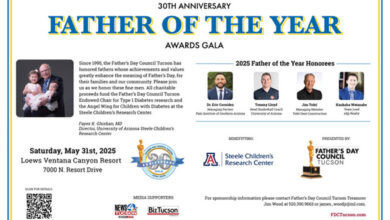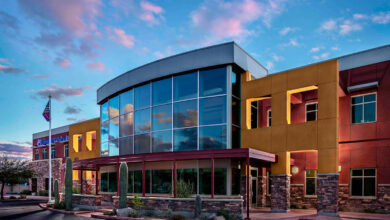
National Science Foundation Grant to Help UArizona Grad Students Solve World Problems
A $3 million grant from the National Science Foundation will support University of Arizona graduate students looking to work across scientific disciplines to take on the world’s grand challenges, from global climate change to sustainable food production.
The grant was awarded to researchers with the UArizona Ecosystem Genomics Initiative, which brings together researchers from a wide range of scientific fields to design new models to inform global climate policy, identify genes and genomic interactions that enhance crop yield, and prepare graduate students to join the national workforce in fields such as ecosystem management, medical genetics and food security.
Over the course of five years, the NSF Research Traineeship BRIDGES program will fund two academic years for 20 master’s and doctoral students from diverse backgrounds and a broad range of disciplines, including genomics, data science, ecosystem and environmental science, hydrology and atmospheric sciences, ecology, biology, plant sciences, entomology and microbial science.
“As a student-centered Research 1 university, the University of Arizona is committed to bridging scientific achievement with student success and opportunity, and this award from the National Science Foundation will further our ability to train a new, diverse and interdisciplinary body of scientists who are equipped to take on our world’s greatest challenges,” said University of Arizona President Robert C. Robbins. “I am excited for the opportunities this grant will open up for our students.”
Partnering with industry and national research labs, selected graduate students will focus on topics such as enhancing crop resistance to drought in the Southwestern U.S., advancing sustainable rice production in Asia, and testing evolution-ecology theories with precision ecosystem experiments.
“Ultimately, our goal is to train the next generation of truly interdisciplinary scientists, who can scale across genes to ecosystems – and intrinsic in that is that we’re basically establishing the building blocks to support a new field,” said Betsy Arnold, a co-principal investigator on the project and a professor in the School of Plant Sciences.
Ecosystem genomics is an emerging field of science that focuses on understanding how the processes that happen at a genetic or genomic level can scale up to influence the ecosystems on which we depend, according to Arnold. That includes agricultural ecosystems as well as wild ecosystems.
“Historically, genetics has been used to understand the biology of individual organisms. But never before has it really been where we could use it to understand the functioning not just of organisms, but of whole ecosystems,” said Scott Saleska, principal investigator on the grant and a professor of ecology and evolutionary biology.
Malak Tfaily, an assistant professor of environmental chemistry and microbial ecology in the Department of Environmental Science and a researcher on the project team, relates it to accurately modeling large-scale global climate processes.
“I tell my students, if you take a small pinch of soil, say 1 milligram of soil, there are thousands, if not millions of organisms, as well as thousands and millions of compounds,” Tfaily said. “Ninety-eight percent of the organic compounds on Earth are actually unknown. The complexity of Earth is so beyond our understanding that it requires a lot of people, a lot of disciplines, and a lot of different perspectives all working together to even begin to approach it.”
Beyond differing technical knowledge and approaches, one of the major challenges in bridging scientific disciplines is rooted in communication.
“We use different vocabulary, different languages. The other science looks almost impenetrable,” Saleska said. “This difference between the disciplines is not just a matter of learning the technical things that those people know, the rules and the equations or the techniques. It’s also a matter of understanding the culture of how they do the science.”
As part of the grant, faculty and students will participate in novel, social science-based “Cultures of Science” training based on the insight that truly transdisciplinary research is not just a technical challenge, but also one of bridging cultural differences among disciplines.
“We are going to really dive deep to understand the cultural differences between sciences,” said Jennifer Croissant, co-investigator on the project and an associate professor in the College of Social and Behavioral Sciences. “It will not only change how we all look at each other and reflect on our own culture of science, but it will help us be better mentors for our diverse science students, because we will have a better understanding of the things we take for granted and how we can best communicate across boundaries.”
Croissant was brought onto the project to specifically study how the students and researchers successfully, and perhaps unsuccessfully, reach across disciplines and backgrounds to work together.
Diversifying STEM is at the core of the project. Although the university is designated as a Hispanic -Serving Institution, graduate programs in science, technology, engineering and mathematics typically do not resemble the diversity seen at the undergraduate level, according to Arnold.
“An explicit goal is to grow the diversity of our graduate programs, and in part to recognize that there is a wealth of talent that could fit into this emergent area in a very new way,” Arnold said. “Sometimes there have been thoughts that diversity and scientific excellence are parallel but not fused together. Our starting point is that they are fused together. From that perspective, we’re centered on how we not only can bring in those diverse students, but also how we can make sure that they flourish.”
An important component of the program is “mentored mentoring,” where students will have the opportunity to mentor a high school or undergraduate student. As part of their fellowship, graduate students will also be teaching and doing outreach to area minority-serving high schools.
Students will also participate in the annual Institute in Ecosystem Genomics Convergence, which will provide an opportunity for NSF Research Traineeship trainees to advance proposals, share results of team-based research experiences, and participate in interactive workshops for professional development and training in inclusivity, pedagogy, science communication and the practice of science.
“All these elements feed into a program that really values the movement of science into other sectors, whether it’s environmental activism, private sector innovation or real-world problem solving,” Saleska said. “Not every Ph.D. student is going to get an academic job. This program will help us engage new science that also prepares them for scientific, nonacademic jobs in many sectors.”
In addition to co-directors Saleska and Arnold, and Tfaily and Croissant, the program includes 12 faculty researchers at the University of Arizona: Bonnie Hurwitz (Department of Biosystems Engineering); Rachel Gallery (School of Natural Resources and the Environment); Regis Ferriere (Department of Ecology and Evolutionary Biology); Katrina Dlugosch (Department of Ecology and Evolutionary Biology; Rod Wing (School of Plant Sciences); Duke Pauli (School of Plant Sciences); Luciano Matzkin (Department of Entomology); Jana U’Ren (Department of Biosystems Engineering); Albert Barberán (Department of Environmental Science); Yang Song (Department of Hydrology and Atmospheric Sciences); Laura Meredith (School of Natural Resources and the Environment); and Erin Leahey (Department of Sociology). Partners include Michelle Higgins, associate director of the UArizona Office of Societal Impact, and Shirley Vincent of Vincent Evaluation Consulting LLC.





